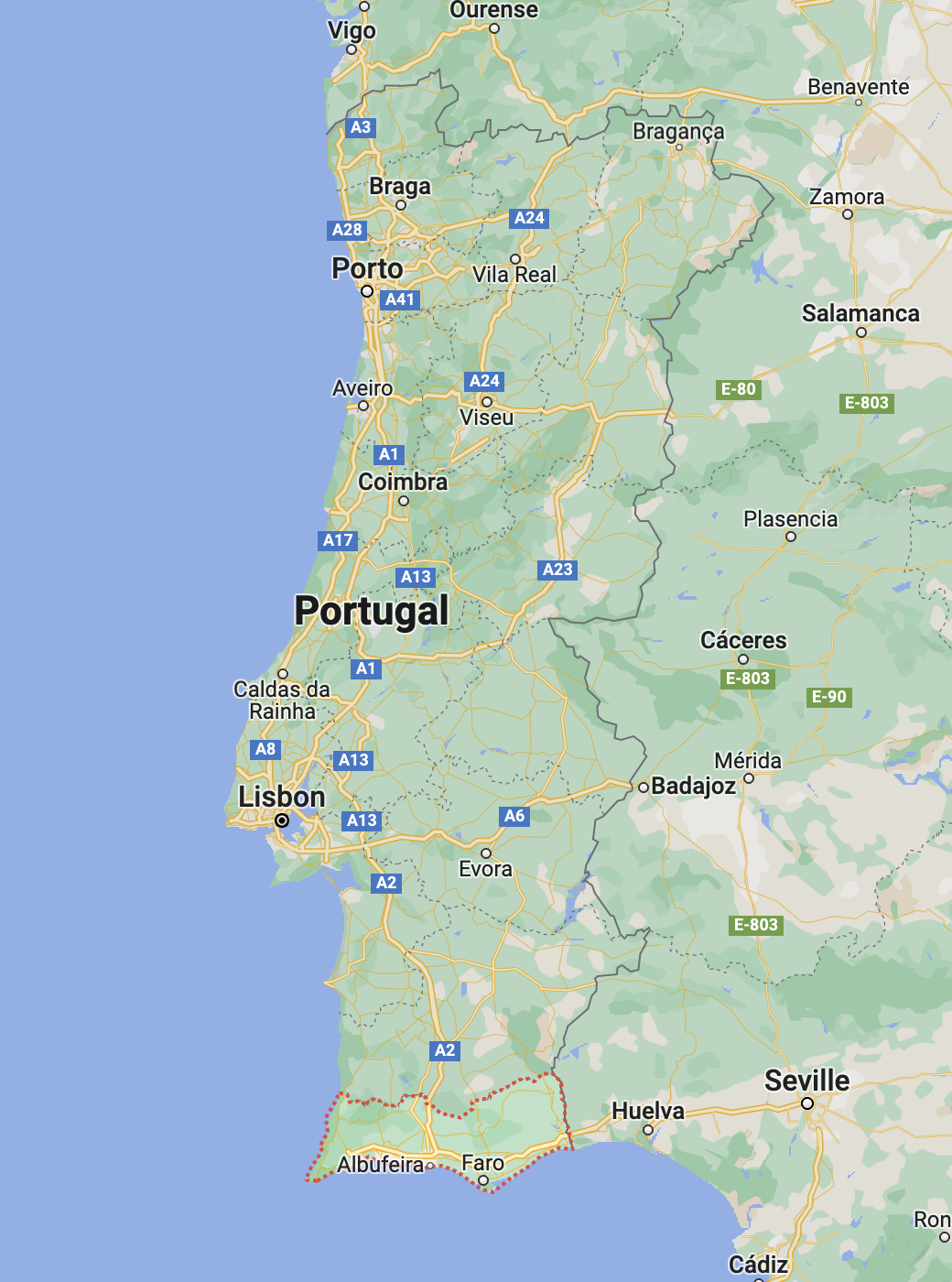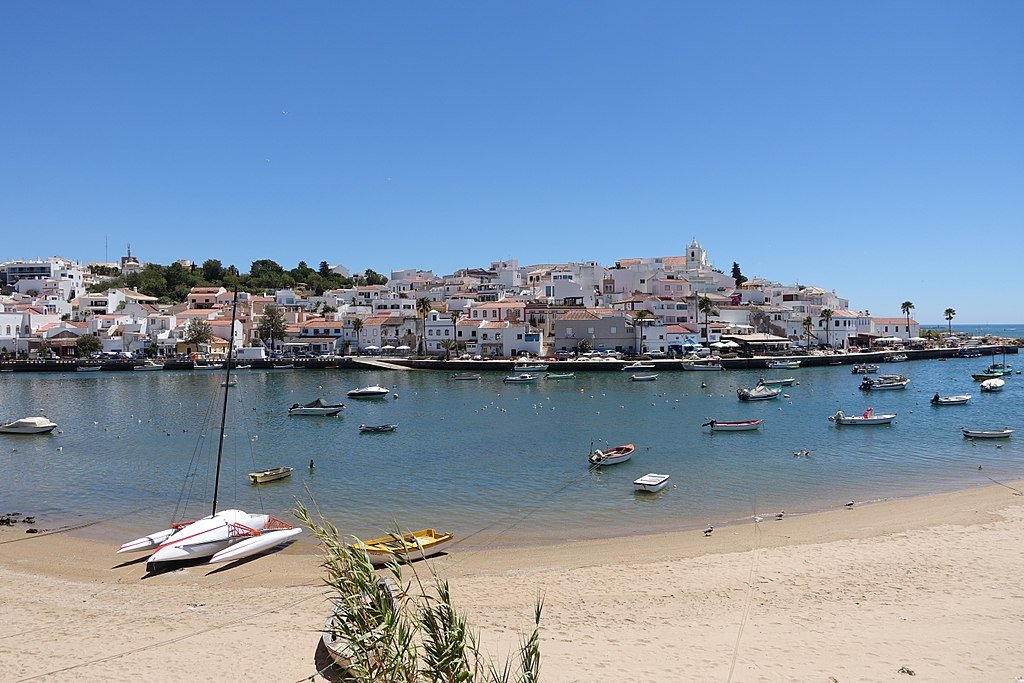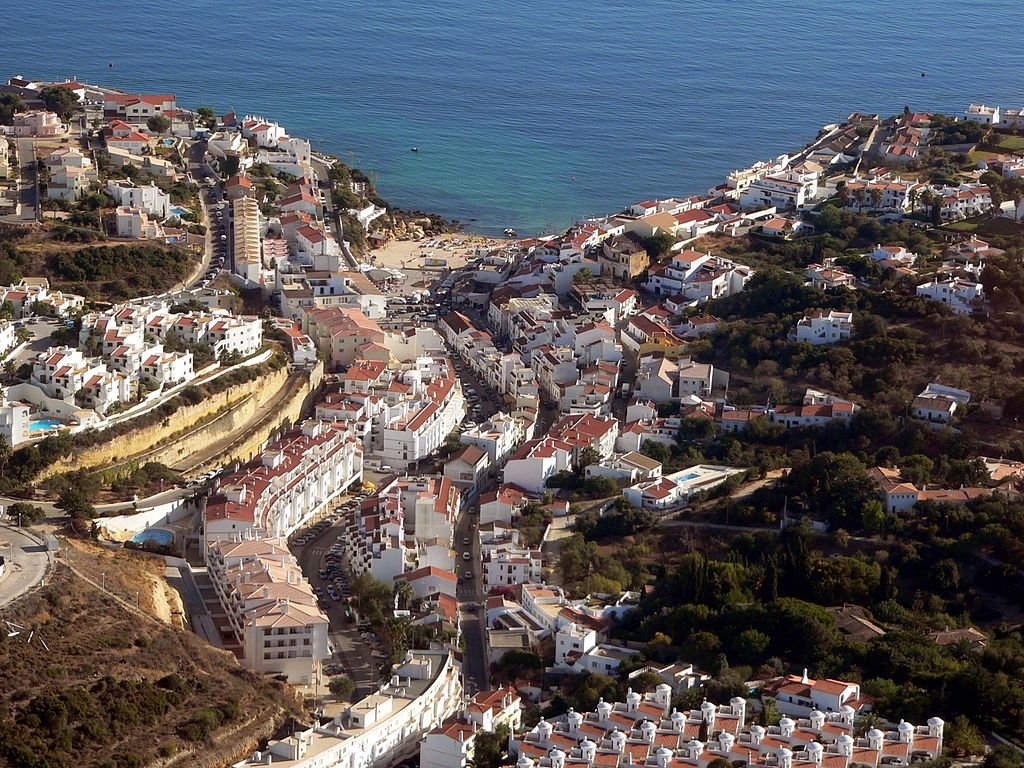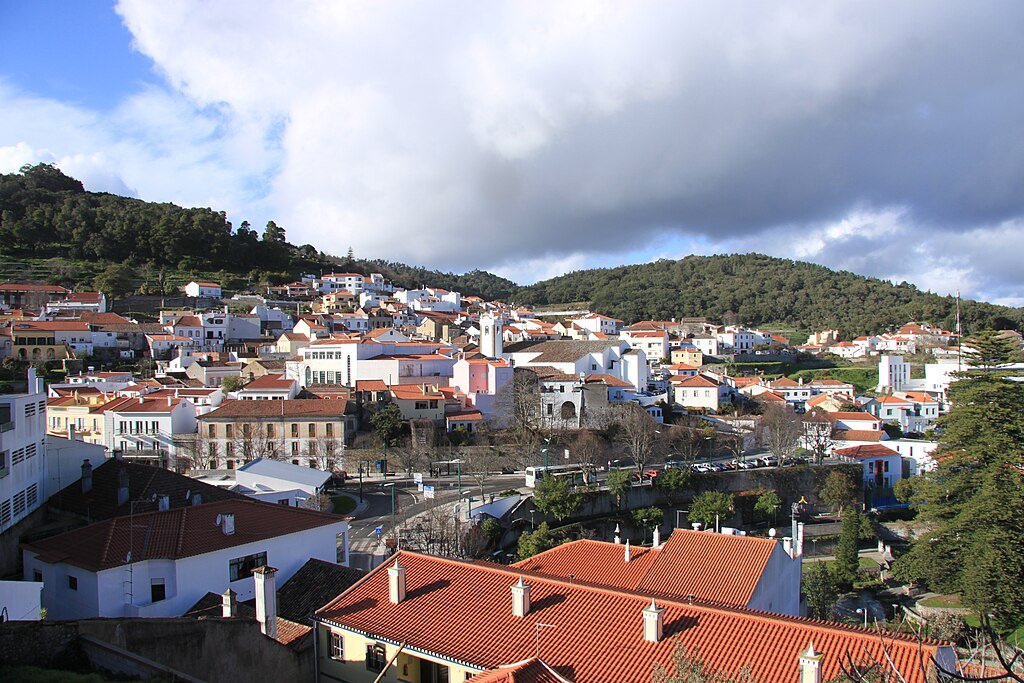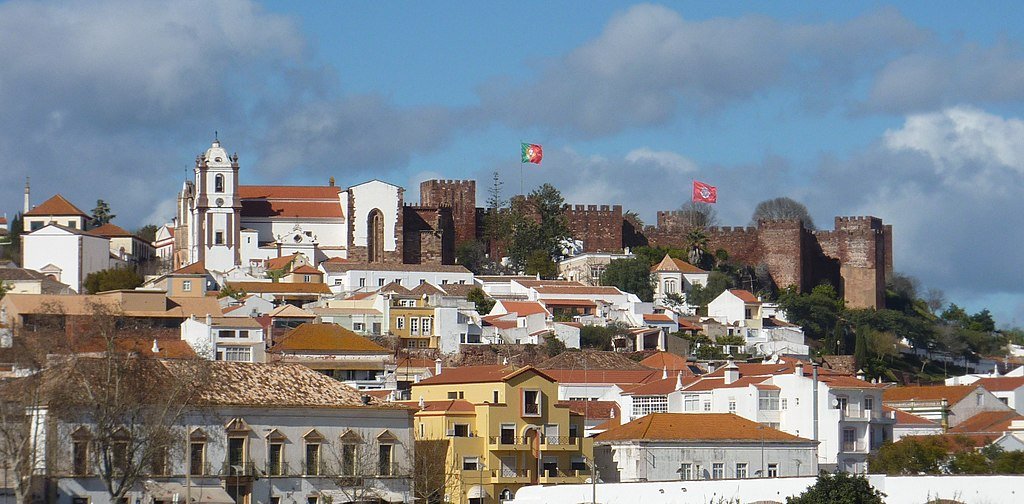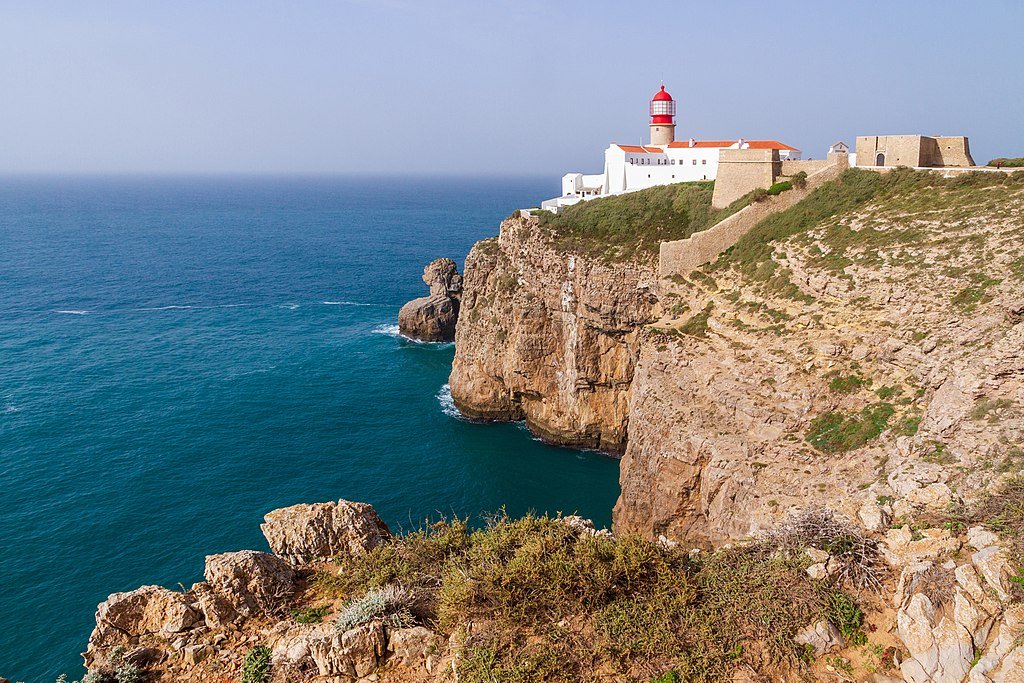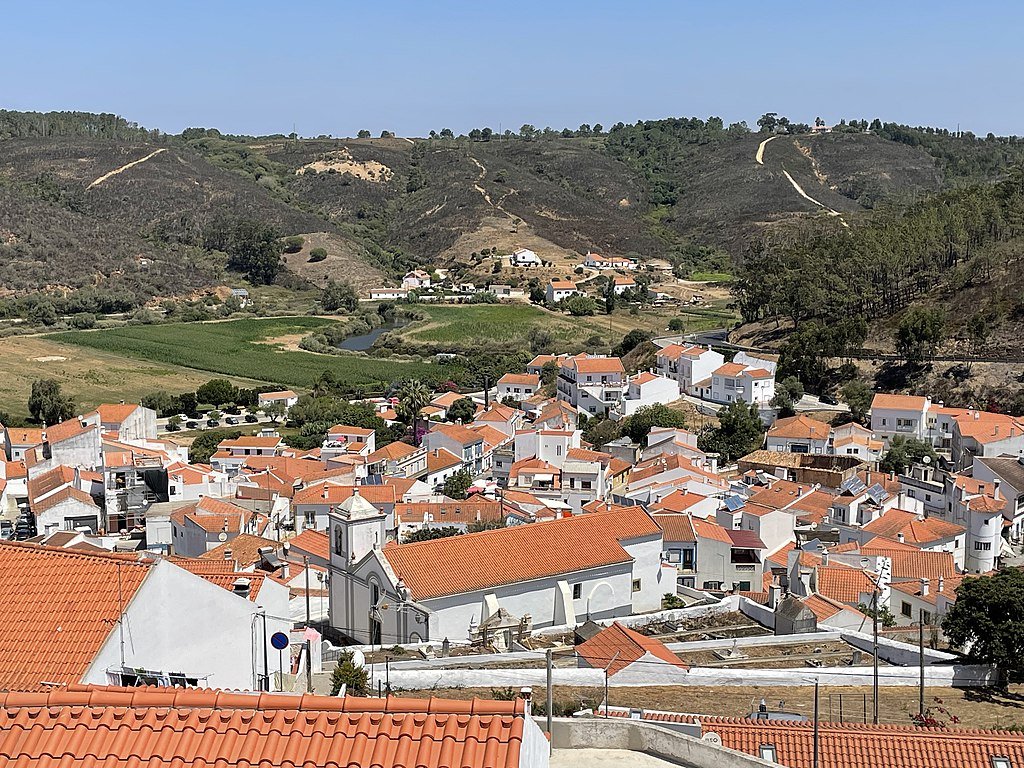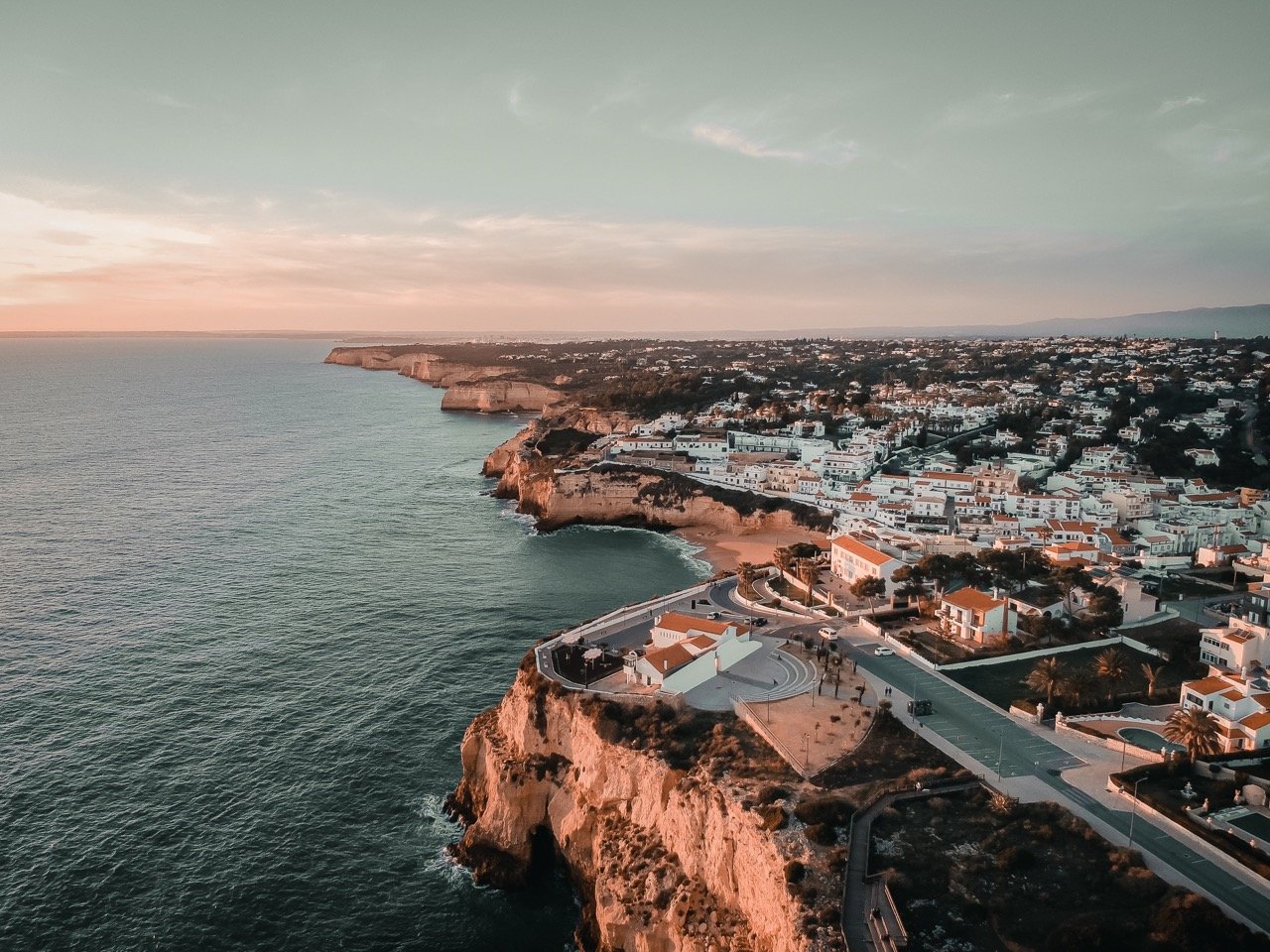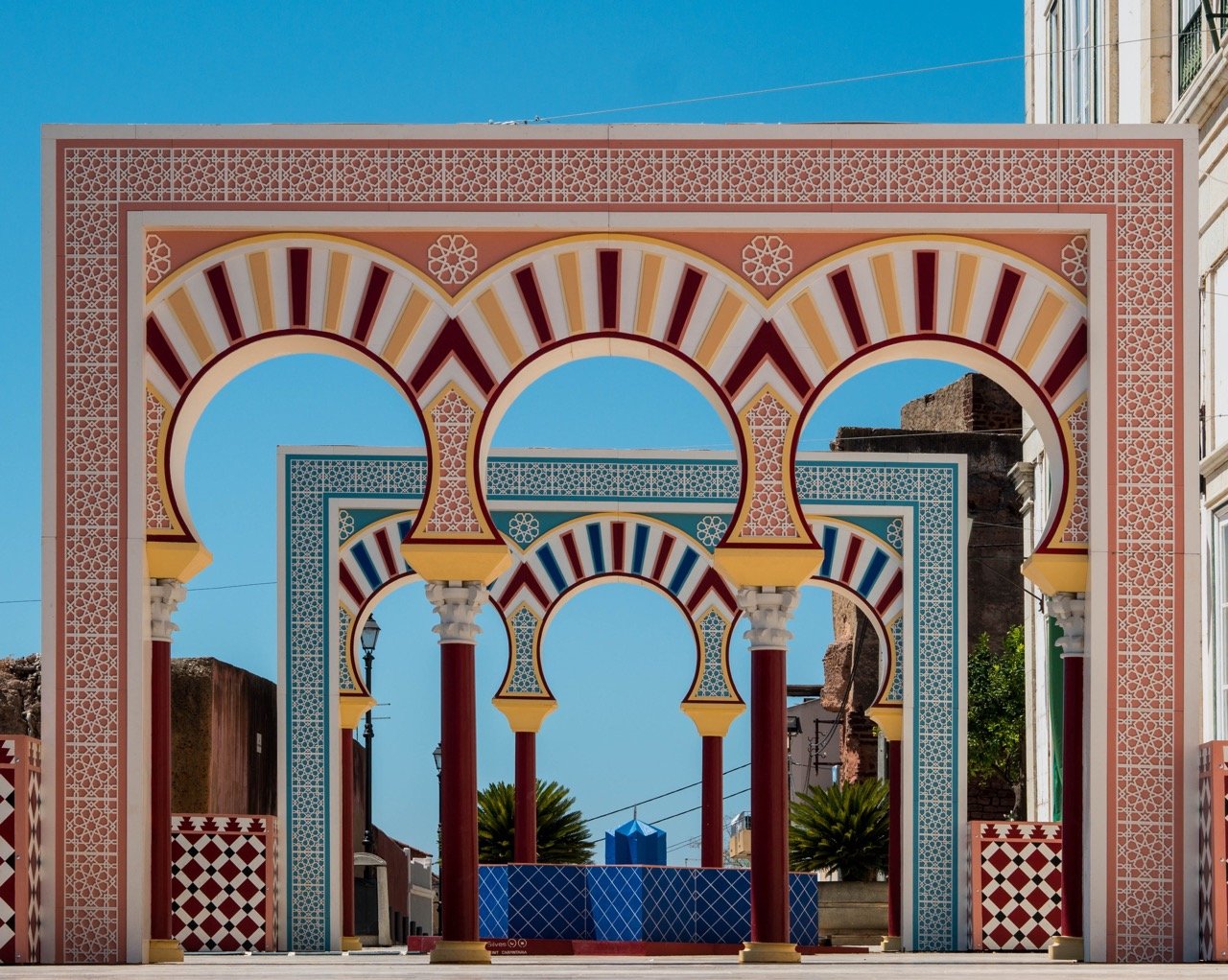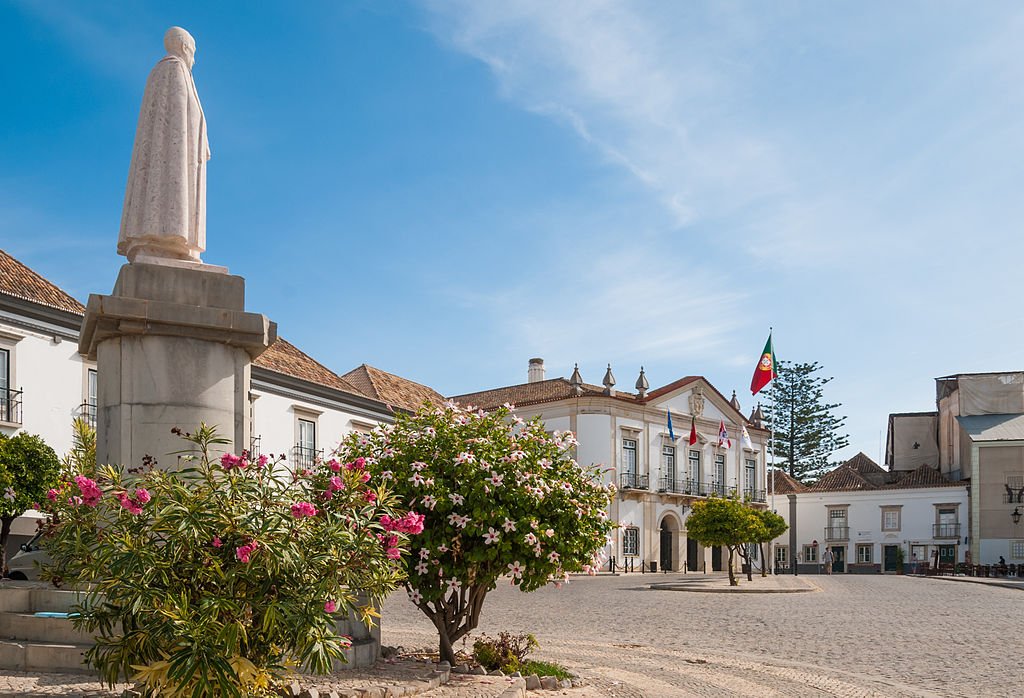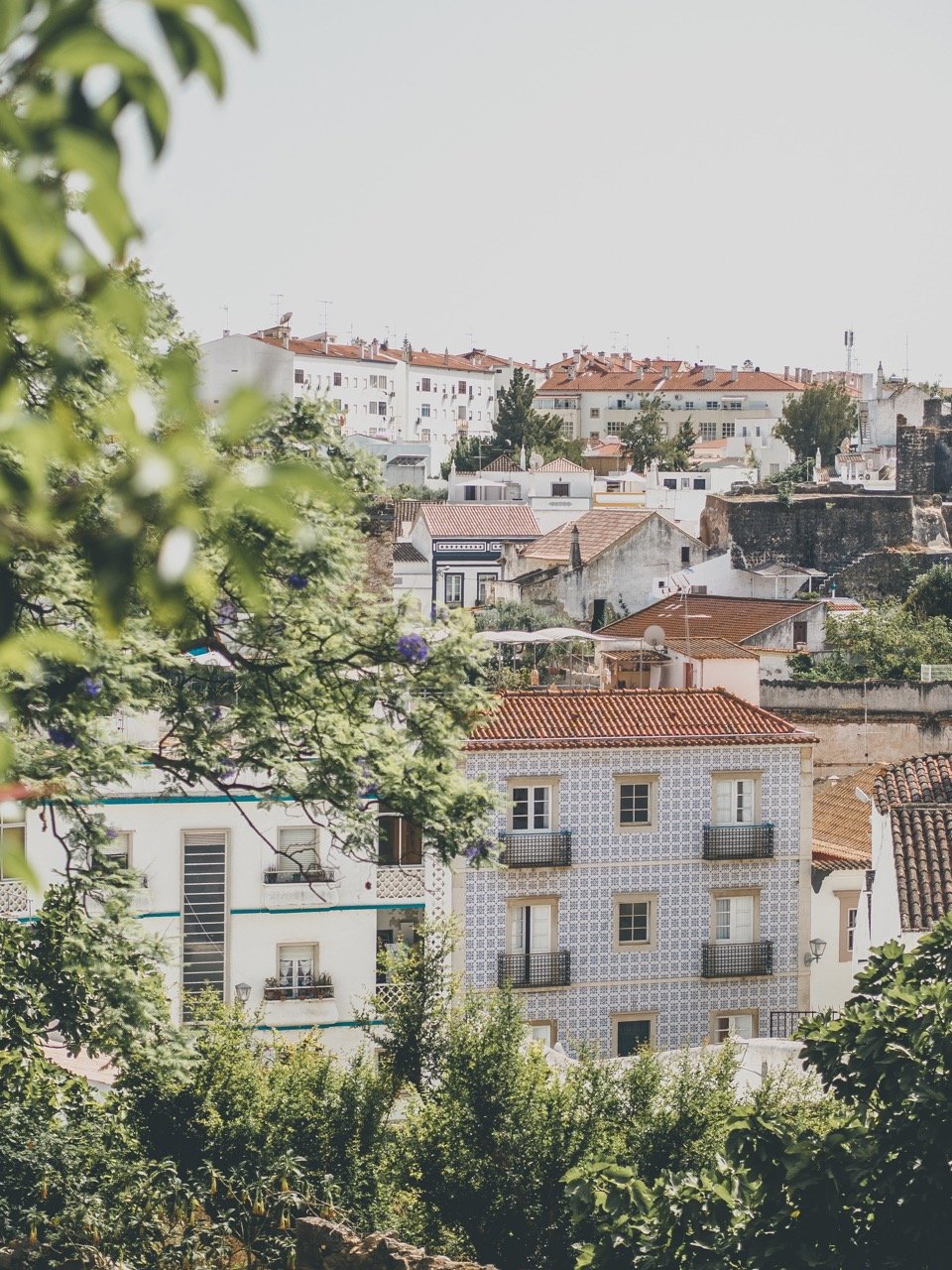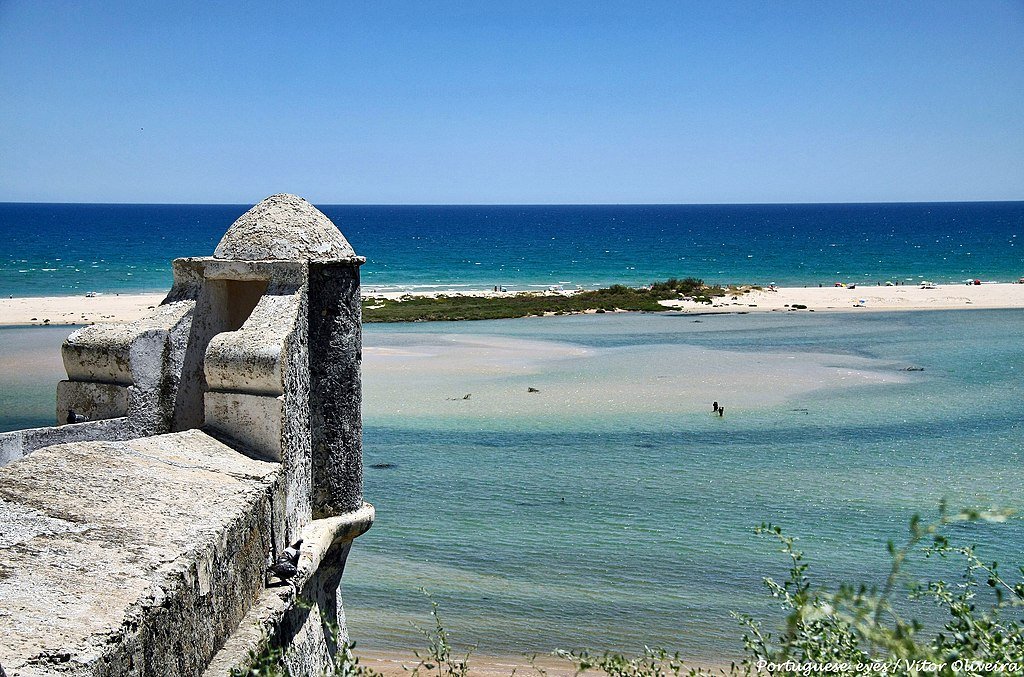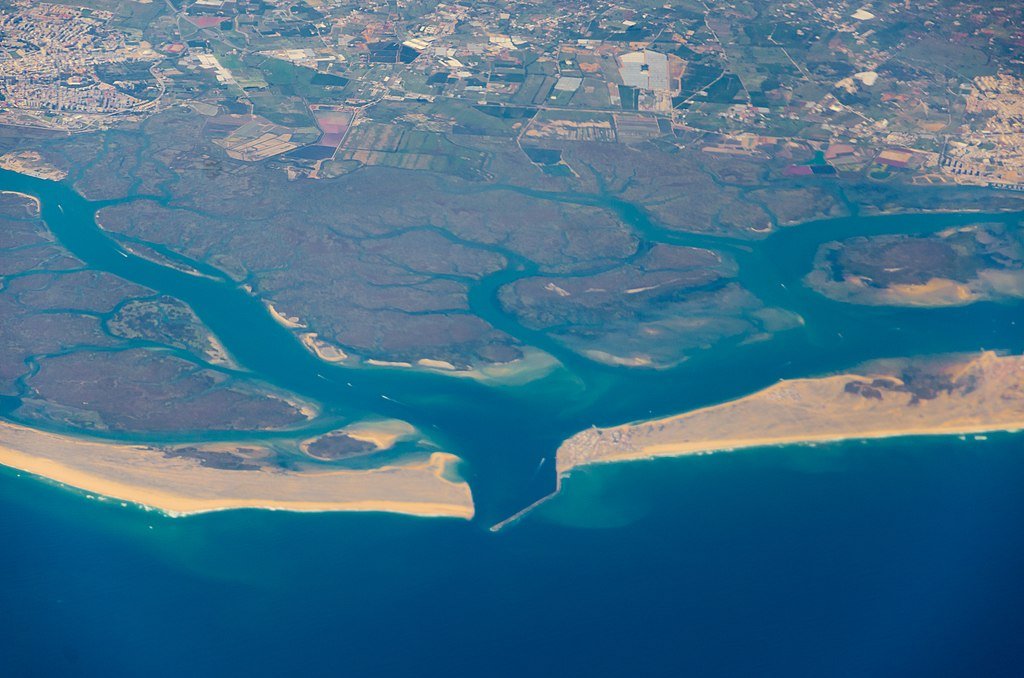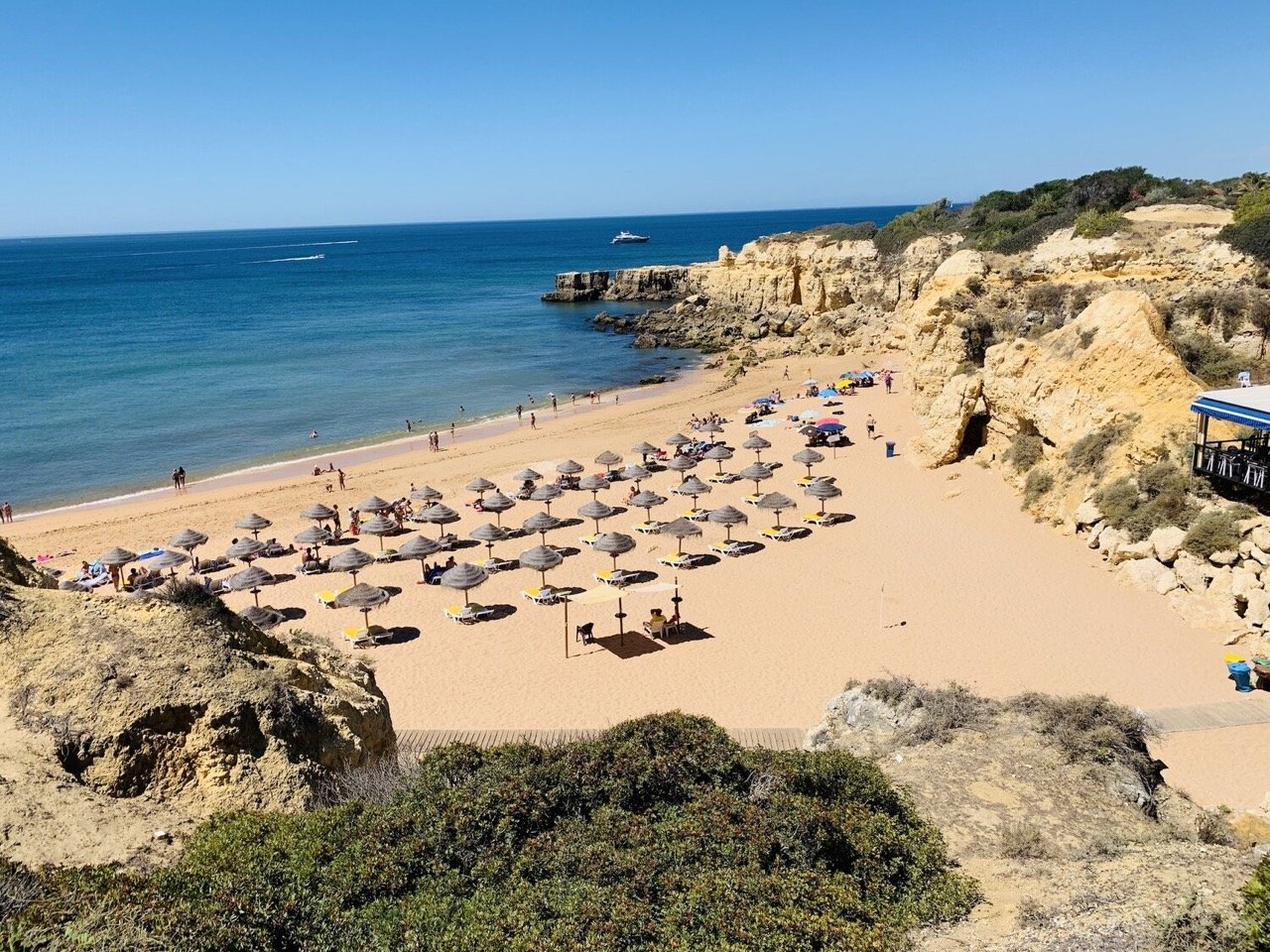A Local’s Guide to Travel in the Algarve, Portugal
Affiliate disclosure: some of the links in this article are affiliate links. If you book using one of them, we’ll earn a small commission. All of our info is free to read and free of ads, so we appreciate it!
The Algarve, my home, is Portugal’s southernmost region, famed for its golden beaches and perpetually sunny weather.
While the region is truly a beach-lover’s paradise, the Algarve has much more to offer than just sun and sand. The countryside, bordered by the Monchique and Caldeirão mountains to the north and the Guadiana River to the east, is particularly pleasant and holds authentic villages and towns that will transport you back in time.
Even though the Algarve seems small, you’ll need to drive for more than two hours to get from one end to the other. As you make your way across its 300-kilometer coastline stretching out along the Atlantic Ocean, you’ll witness countless exceptionally beautiful landscapes and will experience dramatic changes in scenery. The one constant, however, will be the breathtaking views.
Due to its strategic location, the Algarve has always been an important center for the civilizations and empires that have inhabited Portugal over the centuries. You’ll find traces of this diverse heritage in our language, architecture, culture, and cuisine.
More “recently”, over the past century, the booming tourism industry has transformed our region into a world-class beach destination. As a result, the annual population of 460,000 people triples over the summer.
While we’re blessed with an abundance of places to visit and unique things to see and do, there are so many options that planning a visit to the Algarve is always challenging, especially if you’re short on time.
To help you put together a plan for your visit, I’ve put together the following comprehensive guide which will hopefully tell you everything you need to know.
Let’s get into it!
Table of Contents
Algarve planning cheatsheet
 Plan your itinerary with expert advice
Plan your itinerary with expert advice
- Book a Portugal travel consultation with a local expert
 My favorite hotels in the Algarve
My favorite hotels in the Algarve
- Bela Vista Hotel & Spa - pure beachfront luxury in Portimão. $300+/night
- Tivoli Carvoeiro - 5-star with stunning sea views atop Carvoeiro's cliffs. $300/night
- São Paulo Boutique Hotel - intimate and boutique guesthouse in Tavira. $250/night
- RR Hotel da Rocha - great midrange choice on the beach in Praia da Rocha. $200/night
- Hotel Marina Rio - small hotel with cheerful and beachy vibes in Lagos. $200/night
- Villa Moments - great value B&B in Portimão's city center. $140/night
 Guided tours and activities
Guided tours and activities
 How to get around
How to get around
- Car rentals with DiscoverCars
- Local bus routes with Vamus
- Train tickets from Comboios de Portugal
- Long distance buses at Redes Expressos
- Taxis & rideshares with Uber and Bolt


Where is the Algarve?
Portugal’s southernmost region, the Algarve is a narrow strip of land that extends along Portugal’s entire southern coast from the Spanish border in the east to the Atlantic ocean in the west. The regional capital, Faro, is 277 km (172 miles) south of Lisbon; a 3-hour journey by car or train.
With just 500,000 inhabitants and a relatively tiny proportion of Portugal’s total land mass, it is disproportionately important to Portugal’s economy and tourism sector.
This is one of the warmest regions in Europe and with around 300 sunny days per year, it may be the sunniest place on the continent!
How to get to the Algarve
Regardless of your preferred mode of transport and where you’re coming from, you’ll find plenty of options for getting to the Algarve. Here’s a brief overview covering everything from flights to buses, trains, and taxis.
By plane
Faro Airport is the only airport in the Algarve and it is well connected with the rest of Portugal and all of Europe. You can now even fly direct from North America to Faro via multiple weekly flights from New Jersey's Newark airport.
If coming from within Portugal, flights from Lisbon to Faro take 45 minutes and a little over an hour from Porto. You have dozens of flights every day. TAP airline and Ryanair have the most flights and tickets can cost as little as 20-50 euros.
From Faro airport, it’s easy to find further transport options to get to your next destination. Uber, taxis, rental cars, and shuttle buses are all available at the airport.
By train
You have various options for getting to the Algarve by train. Faro, the Algarve's capital city, is the main tranport hub in the region and almost all trains from other parts of the country will stop here. If you're headed to a different town or city, you'll typically need to make a change in Faro to a local train or bus.
Lisbon to Faro is a 3-hour ride on the high-speed Alfa Pendular train. Porto to Faro is a 6-hour ride. Tickets from Lisbon usually cost 20 euros and about 40 from Porto. Tickets should always be purchased on the official websites of Portugal's national rail carrier, Comboios de Portugal.
By bus
Various bus companies run routes into the Algarve and service is reliable regardless of the company you choose. The ride normally takes about 4 hours from Lisbon to Faro.
Buses depart from Lisbon's Sete Rios and Gare do Oriente bus stations about every half hour. Tickets usually cost 10-20 euros. Redes Expressos is one reputable company (although they are all fine).
By private transfer
A private transfer can be a good option for getting to the Algarve from Lisbon or somewhere else in Central Portugal. The drive from Lisbon to Faro takes 3 hours. You should expect for a straight A-to-B transfer from Lisbon to cost between 250 and 350 euros for a 4-seater car.
Many people who book a private transfer also decide to turn the drive into a bit of a tour, stopping along the Vicentina coast on the way down or other places in the Algarve before their final destination. Full-day transfers/tours cost from 500-600 euros typically.
By car
If you're coming to the Algarve after already having been in Potugal, most people arrive from either Lisbon or somewhere in the Alentejo. The drive to Faro from Lisbon is 3 hours and it's on a major highway, so very easy to drive.
A brief history of the region
Visiting the Algarve is your chance to discover some of Portugal’s most interesting history and to experience firsthand the changes this country and region have seen over the centuries.
The first human settlements here date back to the Neolithic times. Since then, Phoenicians, Carthaginians, Romans, and the Moors have all come and gone. The Moors established themselves in Portugal for by far the longest period of time, and during their 400-year rule, they developed the region’s economy and culture.
As such, traces of their reign can be seen everywhere in the Algarve, especially in Silves, the medieval Moorish capital.
In the 13th century, the Portuguese (Catholic) king Afonso III conquered the Algarve and it has remained under Portuguese rule since.
A few centuries later, the Algarve was the home of the Portuguese Discoveries, when Portugal became a world power and was at the forefront of maritime exploration. Sagres and Lagos are especially historically prominent locations since it was from these towns that the caravels (Portuguese sailing ships) departed.
Over the following 500 years, the Algarve, and Portugal in general, benefited enormously from this maritime expansion. However, as this period came to an end, our economy needed to adapt, and so it shifted.
Owing to our proximity to and deep connection with the sea, the region transformed into a hotspot for canned fish in the 20th century. Factories flourished all along the coastline, and this became the main industry in the Algarve.
After the Second World War, canned fish consumption declined dramatically due to an improved quality of life and people’s changing tastes (why eat canned fish when you can have it fresh?!). Suddenly, people had more time (and money) to enjoy themselves, and this is when the tourism industry began to thrive.
From the second half of the 20th century through to today, tourism has evolved into the main economic activity in the Algarve. This probably shouldn’t be surprising in a place where the sun shines for more than 300 days a year, and we have more golden sandy beaches than you can count, crystal-clear waters, and rugged seaside cliffs and coves.


How many days to spend
Minimum days needed - 5 days
To fully enjoy a visit to the Algarve, you need a minimum of five days. This will give you time to explore the main towns, beaches, and natural places as well as get a little off the beaten path, and have some time to just relax.
With a short stay, my recommendation is that you focus on your travel style (beaches, cities, adrenaline, nature, etc.) and choose a couple of main places to visit and things to do and then just stick to that.
So, what to do with 5 days? Well, if you enjoy the beach, choose a coastal town to base yourself in and take day trips to other nearby locations.
If you’d like to explore the countryside, take a road trip and explore some of the small villages in the mountains, spending the night in a few different ones.
If you’re into history and gastronomy, five days will be enough to visit the most significant landmarks and try our delicious traditional cuisine.
Ideal number of days - 7 to 10
However, I believe the ideal amount of time for a visit to the Algarve is between 7 to 10 days.
A week to a week-and-a-half will give you enough time to explore some coastal towns, go to the beach every day (if you want), get out into a few natural parks, and visit smaller out of the way mountain villages. It also gives you the opportunity to engage in some local experiences like wine tastings, orange and medronho picking, or traditional Algarvian cuisine workshops.
For some ideas on how to spend a week here, check out my 7-day Algarve itinerary.
How to get around
The Algarve is small and well connected by a new highway and an older provincial road that crosses the region from east to west. Bus service between the main towns and nearby beaches is pretty decent, roads are in good condition for driving, and you also have plenty of taxis/ubers.
While having a car is certainly the best way to explore the region, you can very much get around without one. That said, if you're here on a short visit or want to get to out of the way places, the bus alone will not be sufficient and you will need to expect to make use of taxis/transfers at least a few times.
Driving in the Algarve
In the Algarve, the A22 highway is the fastest way to cover longer distances. It used to be a toll road, but as of 2025 it is free!
The other main road in the region is the national EN125 road. It was the principal road prior to the construction of the A22. Because there's lots of local traffic on this road, it’s a good option if you're driving shorter distances, but not so good if you want to cross the whole region.
Parking in cities and towns
Almost all towns and cities in the Algarve, as well as beaches and parks, have large parking lots in town or at their entrances. To avoid the hassle of street parking and crowded city centers, I usually recommend parking at a lot on the edge of town and then walking in.
And here's a tip for everywhere you go: when parking your car, be sure to thoroughly check whether the spot you’re parking in is paid or free. Most travelers don’t notice this until after they’ve already gotten a fine, so it really is important to be on the lookout for parking signs.
If you do get ticketed, you must pay the fine in person at the address provided on your ticket or with a Portuguese debit card at an ATM. It’s quite a hassle for tourists, so do your best to avoid this! If there are parking meters in the vicinity of where you’ve parked, that’s a good sign that you probably need to pay…
Most parking meters in Portugal now take a credit card, but it’s a good idea to always have some coins just in case.
Renting a car
You'll find all the big international rental chains as well as lots of local companies which are mostly quite reliable. The local companies tend to be much cheaper the international ones.
The easiest place to get a rental car is Faro Airport, but you’ll also find agencies in major touristic hotspots such as Portimão, Albufeira, and Vila Real de Santo António.
The cost of a rentals varies significantly throughout the year, with summer being by far the most expensive period. From June through early September, you'll see rates as high as 100 euros per day. In shoulder season and winter, the cost plummets and you can find decent cars for as little as 15 euros per day.
To check prices and book, I recommend using DiscoverCars, a car rental website that includes offerings from all the major international rental companies as well as lots of smaller local agencies. You can often find great deals.
Traveling by bus
The bus is a fairly reasonable option for getting around the Algarve if you won't be traveling with a car.
While there are lots of companies that run longer distance and interregional bus routes in Portugal, for travel between cities and towns within the Algarve the bus company you’ll want to know is called “Vamus”. On their website, you’ll find ticket prices, timetables, and maps to help you locate the different routes as well as the names of all the bus stops.
Unfortunately though, the “Vamus” bus won’t get you everywhere, so for some destinations you’ll still need to get a taxi or Uber to complete some journeys.
For getting around within a given city or town, there are local city buses. Each city has its own bus company. In Lagos, it’s called “Onda Azul”, in Portimão there’s “Vai e Vem”, in Albufeira it’s “Giro”, and in Faro, it’s called “Próximo”. If you want to check routes and schedules, the app Moovit is also fairly reliable.
At the local ticket shops (you can find them at the city's main bus stop), you can buy a prepaid card for the city buses and the “Vamus” bus. I always recommend this option as it’s more convenient and you’ll get lower prices than buying single tickets directly with the driver. If you buy a ticket aboard a bus, remember that you will usually need to pay in cash (small bills or coins preferred).
Also, buses are only available during the daytime. So, if you need transport at night, taxis and Uber are your best best.
Taxis and rideshare apps
You'll find taxis in every city and decent-sized town in the Algarve. They don't just drive around though, so hailing one on the street isn’t usually an option. Instead, you'll find them parked and waiting in certain locations or you can call ahead and order (or have your hotel or a restaurant do it for you).
Taxis are easy to spot. They have the traditional black and green paint that no other cars ever use. You might also find older taxis in a beige color. You can rest assured; both are certified taxi drivers!
As with the bus, most drivers don’t take credit cards so you should always have cash when hailing a taxi.
If you want to use an app, both Uber and Bolt are available all over the region. This is usually the easiest option if you’re in a city or decent-sized town on the coast. However, if you’re deep in the countryside, inside a natural park, or in a very small town, you may not be able to find a ride.

Things to do
Most people traveling to the Algarve have only one thing in mind: those glorious beaches that they’ve seen online. The impressive seascapes of towering cliffs, hidden coves, and secluded beaches seem like paradise, and indeed they are!
However, the Algarve is much more than just its beaches.
The Algarve holds a historical significance, cultural diversity, and geographic variation that most people are entirely unaware of, but which are all quite worth discovering.
As you make your way through the region, you’ll find natural parks, historical cities, and authentic countryside villages. Along the way, small local museums are the perfect place to learn more about the region’s history and understand how it became what it is today.
If you’re an adrenaline enthusiast, get on a racecar and drive on a world-class racetrack, cross the border to Spain on a zipline, or skydive over the coastline.
Ever wondered about surfing in the Algarve? Along the region’s 300 kilometers of coastline, you’ll find many beaches perfect for surfing, regardless of your experience level.
Yet, if you’re a foodie like me, you’ll find traditional Portuguese restaurants with the best local cuisine. Food and wine here are made with unique knowledge passed on from generation to generation. To learn more, join a workshop or reserve a wine tasting.
If you enjoy the outdoors, there are dozens of hiking paths and birdwatching hotspots. And for photographers, the Algarve offers the best opportunities for landscape photography. Just look out for the golden hour!
So, while you can’t possibly see and do everything in only one trip, with some good planning you can experience a lot of what this magnificent region has to offer.
Here’s a list of some of my favorite things to do:
Visit the charming villages in the countryside. My suggestions? Monchique, Salir, Alte and Querença.
Enjoy the stunning fishing villages of Ferragudo, Carvoeiro, Salema, Burgau, and Arrifana.
Hit the beach at some of my favorite spots: Carvalho, Caneiros, Barril, Cacela Velha, Camilo, Bordeira, Amoreira, Castelejo, Amado e Odeceixe.
Uncover the Algarve’s first settlers at Alcalar’s megalithic monuments.
Roam the medieval streets of Silves and enjoy the Islamic-influenced architecture.
Discover the historical old town of Faro and its cathedral.
Visit the natural wonders of Praia da Marinha's arched cliffs, the dome-shaped Benagil cave, and the rugged shoreline of Ponta da Piedade.
Take a boat tour in Ria Formosa, Ponta da Piedade or Benagil cave.
Explore the local cuisine with a workshop on traditional Algarvian food.
Discover the Algarve’s unique wines in a wine tasting.
Pick oranges and “medronho” and see how these are transformed into everyday local foods.
Join a workshop to learn how to make traditional Algarvian bread.
Go hiking. There are many trail options available. I recommend the “Sete Vales Suspensos”, “Rota das Cascatas”, “Pontal da Carrapateira” and “Rota do Guadiana”.
Explore the Algarve on a bike. You'll find circular bike routes all over the Algarve, ranging between 50km to 190km, suitable for amateur and professional bikers.
Discover the Carvoeiro shoreline on horseback.
Go birdwatching. The Costa Vicentina and Ria Formosa natural parks provide the best opportunities to watch unique local birds.
Watch the sunrise on a hot air balloon over Alvor fishing village.
Explore sunken warships turned into the largest artificial reef in Europe off Portimão.
Feel the adrenaline rush of driving a race car at the Autódromo Internacional do Algarve.
Go skydiving over the coastline in Alvor.
Learn about marine wildlife and ocean preservation at Zoomarine theme park.
Places to visit
As an Algarvian, I had a tough time narrowing down all the places I love in my region into this list. And, if I'm being honest, I cheated a little bit by naming a single place, but then sometimes including 4 or 5 nearby ones in the description!
But that's really just because when you're talking about beaches that are adjacent to towns or other great beaches, there's really no point naming every single one of them.
So, this list combines a mix of cities, towns, beaches, and natural places that I think everyone should visit when coming to my region. As a local, I've tried to include the main highlights as well as plenty of lesser-known spots and the occasional hidden gem. I can't tell you all my secrets, but I've revealed a few!
To make planning easier, I suggest thinking about the region in terms of east and west. The first 12 places on the list are in the west, while the final 6 are in the east.
The western Algarve
The Western Algarve begins in the town of Sagres, where you find the Cape St. Vincent headland, the most southwestern point in Portugal (and the Iberian peninsula). It then stretches until Faro, the region's capital, just about in the middle of the coast.
Although almost all of the Algarve coastline faces south towards Africa, in what is almost a large gulf (which is why the waters here are warmer than elsewhere), the western section of the region contains the Parque Natural da Costa Vicentina which looks west, out onto the open Atlantic ocean. This section of coast is absolutely beloved by the Portuguese, but perplexingly relatively little visited by foreigners.
The western Algarve is much more developed than the eastern half of the region (except for within the Parque Natural da Costa Vicentina). Some of the "towns” here are really cities, especially over the summer when their populations can easily triple with visitors coming in from all over the world.
This is where you'll find most of the big names you'll have heard of: Albufeira, Portimao, Lagos, Benagil, Sagres, etc. Here, you find those “instagrammable” beaches where huge reddish cliffs guard glorious sandy beaches with rocks jutting out of the water)
The eastern Algarve
The eastern Algarve stretches from Faro until the Portuguese-Spanish border at the town of Vila Antonio de Real.
Much of the eastern coastline is separated from the ocean by the Ria Formosa lagoon and its barrier islands. With much less in the way of tourism development and no cities, it is sleepier and much more relaxed than the western half. You'll still find plenty of people here, but even in summer you'll find places where you can escape the crowds.
The beaches are quite different too. Here, they're flat, backed by a lagoon instead of cliffs, and stretch unbroken for kms, except for the occasional outlet where the lagoon or a river lets out into the sea.
The east coast is quieter, lesser known, and less rugged, with a vibe that is more relaxed and much less touristy. The main towns that you may have heard of are Tavira and Olhão.
1. Ferragudo
The charming fishing town of Ferragudo. Photo: Joseolgon, CC BY-SA 4.0, via Wikimedia Common
Welcome to my hometown! Ferragudo is a charming 500-year-old fishing village and one of the most authentic places you’ll find along the coastline. Local restaurants offer traditional Algarvian cuisine with the freshest local fish and seafood.
And for a scenic view, go to my favorite place of all: Ponta do Altar. Besides the lighthouse, you’ll see Ferragudo’s beaches, the Arade River, Praia da Rocha, and Portimão, with Monchique mountains as the backdrop.
On a clear and sunny day, you can also see Lagos and Sagres 50 kilometers away.
There are lots of pleasant towns close by (like Carvoeiro, which is next on my list) as well as a whole host of great beaches.
2. Carvoeiro
Carvoiero town. Photo: Dr.G.Schmitz, CC BY-SA 2.0 DE, via Wikimedia Commons
The "boneca” rock formation within the Algar Seco cliffs. Photo: Jules Verne Times Two, https://julesvernex2.com, CC BY-SA 4.0, via Wikimedia Commons. Cropped.
The Algar Seco cliffs. Photo: Vitor Oliveira from Torres Vedras, PORTUGAL, CC BY-SA 2.0, via Wikimedia Commons. Cropped
At Carvoeiro, you’ll discover a small beach smack in the village center. The first settlers used this beach to deploy their fishing boats. Today, the town is a tourist hotspot that you don’t want to miss.
Walk up the street leading away from the beach and towards the village church (the street is Rampa Sra. da Encarnação) to enjoy Carvoeiro’s absolutely breathtaking views. From there, continue on a wooden boardwalk along the cliffs and contemplate the astonishing view of the ocean. From the end of the boardwalk you arrive at the impressive Algar Seco rock formations.
Here, the are two particulalry striking formations: one is where a massive hole in the cliff forms a natural swimming pool and the other is a formation called "boneca" that has become very famous. The boneca formation is comprised of two giant side-by-side holes that have somehow formed in the face of the cliff and offer a view out into the ocean. Looking at the holes from the sea, they resemble the eyes of a dall, hence the name (Boneca in Portuguese means “Doll").
3. Benagil Cave and Praia da Marinha
Benagil Cave
Praia da Marinha
Benagil Cave, the famous dome-shaped cave with a sandy beach within it, is a must-see while visiting the Algarve! Book a guided tour and enjoy nature’s mind-blowing work.
Right next to it is another unforgettable location, Praia da Marinha. This stunning beach is backed by massive sandy cliffs and has interesting rock formations jutting out of the water. It's no wonder that it was granted the title of “most beautiful beach in the world" by Condé Nast Traveller and CNN.
Enjoy the views while looking for the heart-shaped photo location at Praia da Marinha!
4. Monchique
Monchique is a tiny village secluded in the highest mountains in the Algarve. The forest and the altitude create a unique microclimate, making this the chilliest and rainiest location in the region. The town is quite pretty and a pleasant place to visit for a change of scenery.
While there, try the Bolo de Tacho (a local cake), the Medronho Firewater, and the Chouriça (a type of sausage) to taste the local cuisine. You’ll be delighted!
To enjoy the most beautiful sunset around, head up to nearby Mount Fóia. At 902 meters of altitude, this is the highest point south of Lisbon. From there, you’ll see all the south and western coastline. Be sure to have your camera ready!
It's a 10-minute drive from Monchique to the mountain's summit. Once up there, hikers have the option to walk the approximately 7 km "PR3 MCQ” trail that takes in some really nice scenery. You can find the route on Alltrails.
If a little relaxation is in order, the very nice Caldas de Monchique thermal baths are always a great option.
5. Silves
Silves is a historical city marked by centuries of Roman and Moorish occupation. Wander the medieval cobbled streets, visit the city’s castle, and enjoy the astonishing view from the top of the walls. The Cathedral, built on the remains of an old mosque, is another landmark you can’t miss!
Once you find the local museum, you’ll get a glimpse of the past as you feast your eyes on the archeological artifacts found all over the city. While exploring the city, you’ll notice a few Roman remnants and Islamic-influenced architecture.
6. Lagos & Ponta da Piedade
Praça Luís de Camões in Lagos’ old town. Photo: Tibor Kovacs, CC BY 2.0, via Wikimedia Commons
Lagos is a charismatic coastal town celebrated for its historical significance during the Portuguese maritime expansion. It's a busy place with a pleasant city center that is full of shops, restaurants, and bars.
I often recommend it as a decent place to base yourself in while visitng the region because it has enough going on in town and nearby that you won't get bored.
Although much of the city is fairly modern, it has a very nice old town where you’ll find historical buildings, such as the Santa Maria Church, pretty squares, a good museum, and the ancient city walls.
Some of the Algarve's best beaches are on both sides of the town, like Praia da Dona Ana which is an absolute must-visit.
A few kilometers away from the town center is Ponta da Piedade, a towering limestone cliff formation that is like no other. From the top, you have views over the Portimão and Carvoeiro coastline as well as the town of Sagres.
Although you can visit its sea pillars and natural arches from land, the best way to enjoy this dramatic coastline is really on a kayak tour.
I've gone into more detail on the city in my guide to Lagos.
8. Cabo de São Vicente (Cape St. Vincent) and Sagres
Cabo de São Vicente and its lighthouse. Matthias Süßen , CC BY-SA 4.0, via Wikimedia Commons
Sagres’ fortress. Photo: Bextrel, CC BY-SA 4.0, via Wikimedia Commons
Praia do Beliche. Photo: Vitor Oliveira from Torres Vedras, PORTUGAL, CC BY-SA 2.0, via Wikimedia Commons
Cabo de São Vicente - Cape St. Vincent - is the southwesternmost point of Portugal, and therefore mainland Europe. A lighthouse sits atop the imposing cliffs, from which you have terrific views over the ocean where the deep blue water contrasts brilliantly with the limestone cliffs and golden-sand beaches. The seascape here is a sight to behold.
Right nearby, Sagres is a tiny fishing village deeply connected to the Portuguese Discoveries in the 15th century. After all, this is where the caravels departed to the New World. At Fortaleza de Sagres, you can visit the actual spot from where they departed.
The beaches surrounding the area are also extremely impressive. Praia do Beliche is one of my favorites.
9. Carrapateira and its beaches
Praia da Bordeira outside of Carrapateira
The wonderful Praia do Amado. Photo: Aires Almeida from Portimão, Portugal, CC BY 2.0, via Wikimedia Commons
Carrapateira is a tiny fishing village on a splendid stretch of coast in the “Parque Natural do Sudoeste Alentejano e Costa Vicentina” park. The entire park is splendid, with some of the best beaches in Portugal, but the area around Carrapateira is particularly beautiful.
The main appeal of visiting the town is to go to the fantastic nearby beaches, but it also has some really excellent restaurants (especially for seafood).
Praia da Bordeira and Praia do Amado are two of the best beaches, both with incredibly impressive locations. They sea can be a bit rough, which is why they are famous with surfers and bodyboarders.
While you're here, I also recommend visiting Arrifana, another small fishing village to the west of Carrapateira. Here, the sea is even rougher, and only the most courageous go in! Again, it's popular with surfers, especially the beach of Monte Clérigo.
The riverside town of Aljezur, which boasts a 10th century hilltop castle, is also always worth a stop.
10. Odeceixe
Odeceixe town. Photo: Lolo7303, CC BY-SA 4.0, via Wikimedia Commons
Odeceixe beach. Photo: Vitor Oliveira from Torres Vedras, PORTUGAL, CC BY-SA 2.0, via Wikimedia Commons
Like Carrapateira, Odeceixe sits within the Costa Vicentina Natural Park. It's a charismatic little village right on the banks of the Seixe River, which forms the border between the Algarve and the neighboring Alentejo region.
The town's traditional white-washed houses pile on top of the hills in a really lovely way, attracting travelers from all over the world.
A few kilometers away, there’s Odeceixe Beach, considered one of Portugal’s 7 wonders. On one side, the beach faces the mouth of the Seixe River, and on the other, it faces the Atlantic Ocean.
This unique feature attracts both surfers and families with small children looking for the perfect day at the beach.
11. Portimão
Portimão is a historic fishing town dating back to pre-Roman times, but the town was largely destroyed in an earthquake in the 1700’s, so little of its historic buildings remain. It’s also now a stop on many cruise ships’ itineraries, so it gets packed during the day as day trippers head into the city or nearby areas.
The riverfront area is a pleasant place to spend an hour or two though, and it makes sense to stop here if you’re heading east from Lagos or the western coast.
Nearby, you have the Benagil Cave, Praia da Marinha, Praia da Rocha, and the gorgeous João d’Arens cliff formations.
You can also go skydiving here or rent a race car and drive on the city's race tracks. There's a lot to do…
Learn more in my guide to Portimão.
Portimão and its wonderful coastline
The João d’Arens cliffs. Photo: Aires Almeida from Portimão, Portugal, CC BY 2.0, via Wikimedia Commons
Praia da Rocha. Photo: Steven Fruitsmaak, CC BY-SA 3.0, via Wikimedia Commons
Portimão is a historic fishing town dating back to pre-Roman times, but the town was largely destroyed in an earthquake in the 1700’s, so little of its historic buildings remain. It’s also now a stop on many cruise ships’ itineraries, so it gets packed during the day as day trippers head into the city or nearby areas.
The riverfront area is a pleasant place to spend an hour or two though, and it makes sense to stop here if you’re heading east from Lagos or the western coast.
Nearby, you have the Benagil Cave, Praia da Marinha, Praia da Rocha, and the gorgeous João d’Arens cliff formations.
You can also go skydiving here or rent a race car and drive on the city's race tracks. There's a lot to do…
Learn more in my guide to Portimão.
12. Loulé
Moorish architecture in Loulé
Loulé is the perfect place if you’re looking to explore Algarve’s culture. Visiting the medieval Castle and the local museum will help you understand how the city changed over the centuries.
Another landmark you can’t miss is the Moorish-styled Loulé Market. Inside you’ll find the freshest local produce, fish, seafood, and traditional handicrafts. I recommend visiting on Saturday, early in the morning. That’s the busiest day of the week at the market and when you’ll have more vendors.
For a remarkable experience, join a guided tour of the Rock Salt Mine, 200 meters deep into the earth. You’ll discover unique geological formations and the mine’s history.
If you're interested in visiting, here's my guide to Loulé.
13. Faro
Faro's main square. Photo: Abrget47j, CC BY-SA 3.0, via Wikimedia Commons
Ilha do Farol near to Faro. Photo: Otávio Nogueira from Fortaleza, BR, CC BY 2.0, via Wikimedia Commons
Faro is the Algarve’s regional capital and the largest city in the region. It's also home to the main airport.
Lots of people will tell you that Faro isn't worth visiting at all and that you should just arrive and depart straight away. I very much disagree. It certainly isn't the prettiest town in the region, but it has lots going on, good transport connections, and it has a pleasant old town, and a nice riverfront esplanade that affords good views of the Ria Formosa lagoon. It's worth visiting.
Besides just wandering around, you should check out the Santa Maria Church, the town's very good municipal museum, the Chapel of Bones, and take a water taxi to Ilha do Farol, an island with a fabulous beach.
You can find more info in my guide to Faro.
14. Tavira
Tavira
Ilha de Tavira beach. Photo: Vitor Oliveira from Torres Vedras, PORTUGAL, CC BY-SA 2.0, via Wikimedia Commons
Tavira is a sleepy town in the Algarve's less-visited eastern half and its quiet atmosphere makes for a perfect break for the more heavily touristed towns of the western Algarve.
The town's Roman bridge and the remains of a medieval castle are the most visited landmarks, but you also shouldn’t miss the Igreja da Nossa Senhora das Ondas or the Convento da Nossa Senhora da Graça.
I'd recommend timing your visit right so that you can enjoy an unforgettable sunset at the beach on Tavira Island.
Near to town, you can also take a boat across the Ria Formosa lagoon, getting out to various barrier islands which have really fantastic beaches.
For more info on the city and surroundings, have a look at my guide to Tavira.
15. Cacela Velha
Cacela Velha beach. Photo: Vitor Oliveira, CC BY-SA 2.0, via Wikimedia Commons
Cacela Velha is a stunning small village overlooking the Ria Formosa. Due to its size, you can easily explore it in one afternoon. While strolling the streets, you’ll see typical Algarvian houses showing details of medieval and Moorish architecture.
At Cacela Velha Fortress, you’ll be baffled by the astonishing views.
Cavelha Velha Beach is one of the most famous in the Algarve due to its warm waters and lagoons. However, getting there isn’t that smooth! On a low tide, you can walk to the beach. Yet, when the tide is high, you must get on a taxi boat.
One piece of advice: always check the tide timing for your return. Otherwise, you might get stranded.
16. Alcoutim
Alocutim on the left and Sanlucar de Guadiana (in Spain) on the right, separated by the Guadiana River. Photo: Vitor Oliveira from Torres Vedras, PORTUGAL, CC BY-SA 2.0, via Wikimedia Commons
Alcoutim is a traditional Algarvian village in the countryside near the border with Spain. It's built along the banks of the Guadiana River and you can relax at the fluvial beach of Pego Fundo, explore the views from the town's castle, and marvel at the Renaissance architecture of the Igreja Matriz Church.
If you're up for a shot of adrenaline, get on a zipline and fly over the river, which will take you across the border and into Spain!
17. Salir and Alte
Fonte Grande canal in the village of Alte. Photo: Husond, CC BY-SA 3.0, via Wikimedia Commons
If you’re looking for authentic villages in the countryside, the towns of Salir and Alte will make your day! Located in the mountains about 30 minutes from Albufeira, they're both quite off the beaten path and provide a very welcome break from the busier and more touristy coastal towns.
Wander the cobbled streets of Salir and marvel at the remains of the 12th-century Moorish castle and the traditional whitewashed houses. Close by, there’s Fonte Benémola, a nature reserve filled with water springs all year round. There are a number of good hiking trails.
In Alte, you’ll find a well-preserved 13th-century Church, the oldest building in the village. Close by you’ll find the famous Cascata do Vigário, a stunning waterfall surrounded by grassland. Due to the low rainfall levels, know that sometimes the waterfall dries up over the summer.
Right in Alte town you also have Fonte Grand and Fonte Pequena, two natural swimming "canals” fed by freshwater springs. Locals like to come here to swim and barbecue and they're perfect for a hot summer day.
18. Reserva Natural da Ria Formosa
An aerial photo showing a section of the lagoon and barrier islands. Photo: Nicotappero, CC BY-SA 4.0, via Wikimedia Commons
The expansive Reserva Natural da Ria Formosa is a protected reserve that covers a huge swath of the eastern Algarve and has severly restricted development. Within the reserve are barrier islands whose fantastic sandy beaches can only be reached by boat and are therefore comparatively uncrowded.
Frequent boat tours depart from many of the towns in the area (Faro, Olhao, Fusesta, Cabanas, etc.), so you can use any of them as a base if a few days on these relatively secluded beaches sounds appealing to you.
Making your way out to the lagoon and this part of the Algarve provides a totally different feel from the rest of the region. The towns feel different, the beaches are totally different (no big cliffs), and you'll see far fewer people.


Where to stay - best bases
If you enjoy having a single base and taking day trips from it instead of spending each night at a different location, I’d recommend choosing a hotel in Faro or Portimão. These coastal cities are the largest in the Algarve and offer the best connections with the rest of the region.
For longer stays (more than 5 days), I'd recommend choosing two different bases; one in the west and one in the east.
Faro
Faro is certainly not the most charming city in the region, but it is extremely convenient. Its old town is nice and full of restaurants and bars that are busy all day and night. It also has the best public transport connections and is smack in the middle of the region, meaning it's an ideal base for day trips.
Here are some of my favorite hotels:
3HB Faro Hotel - You can usually book a standard room for around 300€ per night, with rates increasing dramatically in July and August.
Hotel Faro & Beach Club - Nightly prices start at 200€ per night for a standard room during the summer.
AP Eva Senses Hotel - Accommodation rates run 200€ per night during the summer and 100€ during the winter.
Portimão
Portimão is a sort of perfect compromise between city and beach - it's big enough to have everything that you need for a longer stay, it has a charming old town, a nice riverfront esplanade, and it's walking distance from the beach at Praia da Rocha.
It's a good base for day trips around the western Algarve, putting you within 15-45 minutes of places like Albufeira, Silves, Monchique, Aljezur, Sagres, Lagos, etc.
Here are a few of my favorite hotels in:
Bela Vista Hotel & Spa - Accommodation rates start at 450€ per night during the high season.
Hotel da Rocha - Prices range from 100€ to 200€ per night for a standard double suite.
NH Marina Portimão Resort - Rates here vary significantly depending on the season, with summer prices between 150 and 300€ and winter prices as low as 70€.
Weather & when to visit
The Algarve’s beaches have become famous getaways for travelers worldwide, now competing with even the most famous beachside areas throughout the Mediterranean. The region is popular year round, so there really is no low season anymore. But there is a high season; summer.
Summer
From July to August are the busiest months in the Algarve. The temperatures are scorching, beaches are packed, the population triples, there’s traffic everywhere, and hotel rates skyrocket. If you’re looking to relax or travel on a budget, this isn’t the best time of the year. The beaches are quite nice, however.
Can you tell that summer wouldn’t be my top choice?
Winter
During the winter (December to late March), you’ll find colder temperatures, a few rainy days, empty beaches and towns, and the lowest accommodation prices.
Although it's obviously not beach season, winter temperatures in the Algarve are extremely mild compared to much of the Northern Hemisphere and we also get relatively little rain and the sky is typically quite blue and clear. To give you an idea, consider that January temperatures typically hover between 8°C and 16°C (46°F to 61°F).
It's still obviously the wrong time to come if you want to hit the beach, but it can be very nice if you just want to do some sightseeing, go for hikes and walks, enjoy the views, play a little golf, etc.
However, note that many places, such as restaurants, hotels, and theme parks will be closed for the season. In larger towns you won't have any problems finding a hotel or a place to get a meal, but the region will feel a bit sleepy.
For me, as long as you don’t mind a little chill and some possible rain, winter is actually a great time to explore the Algarve’s natural areas and pretty towns.
Spring and fall
If you’re looking for a compromise - with good weather, but better prices and smaller crowds - I would suggest visiting the Algarve in May/June (late spring) or in September/October (early fall). These months sit at the beginning and end of peak season when most everything is open and the season is more or less completely in swing, but the crowds aren’t at their worst.
Traveling in late spring or early fall means you’ll get better value for money on your accommodation, you can enjoy warm temperatures but nothing too hot or too cold, you have little risk of rain, and you can hit the beaches and towns with comparatively fewer crowds.
If your schedule is flexible, I absolutely recommend coming here in May, June, September, or October. These are those “just right” months for traveling in the Algarve when you really do get the best of everything.
A few Algarve travel tips
So far, I’ve gathered the standard information you need for your trip to the Algarve. Now, I’ll talk go over a few details that most travelers discover only once they arrive.
Always make bookings in advance!
Most people only think about booking their flights and hotels in advance and often disregard other activities. However, when visiting the Algarve, I always recommend booking tours & experiences, car rentals, transfers, and in some cases, even restaurants in advance.
I know travelers are always in a rush want the freedom to change plans up, but there’s a good reason why I recommend locking some thing in early:
Over the summer, everywhere (from restaurants to rental cars and theme parks) is packed with tourists and locals alike. The population here triples during the high season, so competition for everything is fierce, and lots of things sell out completely. If you don’t have reservations, you will almost certainly miss out.
Even in the winter, when you would expect there to be few tourists (this is true) and wide open availability for just about everything, you still need to book ahead. There are lots of sporting events and corporate outings that take place in the Algarve during the winter, so the region does not really empty out.
And while the crowds are significantly reduced from summertime, lots of restaurants, hotels, and other tourism-related businesses close down over the winter, so the few ones that are open often get completely sold out.
So, regardless of the season, always book your activities in advance! Besides guaranteeing availability, you can get early bird rates for hotels and car rentals.
Be sure to have some cash on you
Card payments are widely accepted in the Algarve, even for small purchases. Nonetheless, sometimes it’s just more convenient to pay in cash, especially on buses, taxis, supermarkets, beach restaurants, and other small businesses.
Tipping
While some European countries have a tipping standard if 10% of the bill’s total amount, that is not the case in Portugal. Here, you tip whatever amount you feel it’s fair (or you don't tip at all).
We don’t follow the 10% rule, and if you didn’t enjoy the service, you won’t be pushed to pay anything more than the bill itself.
How to visit Benagil Cave
This is the most visited natural landmark in the Algarve and it has become incredibly famous and is heavily, heavily promoted.
And that’s why you should lower your expectations! Online, you’ll find hundreds of pictures of a stunning and empty dome-shaped cave with a natural skylight. The reality is quite different.
Yes, it’s a marvelous location and somewhere you should absolutely visit. However, the caves are almost never empty, and there are so many people around you (all year round) that you are very unlikely to get that instagram-perfect picture that you’ve doubtless seen online.
So, to visit Benagil Cave, I highly recommend you book a boat or kayak tour. Here’s why:
There’s no walking access into the cave.
Entering the cave will always depend on the sea conditions. That’s why tour companies operating here only hire experienced locals. Also, if safety conditions aren’t guaranteed, any reputable company will cancel the trip and refund any amount you have paid.
Don’t ever swim into the cave! There’s so much boat traffic in and out of the cave you could easily get injured. Also, the rising tides and ocean currents can pull into the cliffs and leave you in a dangerous situation, even if you’re a strong swimmer.
If you hike on the Seven Hanging Valleys Trail, you’ll get to the top of Benagil Cave’s skylight. From there, it will just look like a hole in the ground surrounded by a fence. Probably not what you had in mind… Although there are some pictures online where you clearly see inside the cave, those photos can only be taken if you scale the fence. Don’t do that! The cave is too high, and you can easily fall through.
Please note that as of August 2024, the government has imposed limits on visitor numbers to the cave as well as a host of new restrictions on its access and what can be done within it. The official explanation is only available in Portuguese, but this website has a decent English summary of the new restrictions.
Hiking by the cliffs (safely)
All throughout the western Algarve you’ll find staggering seascapes, hidden beaches, and plenty of “algares”, holes on the ground peaking down into the cliffs (similar to Benagil Cave but much smaller).
Some of the trails are quite remote, so it’s best to always be prepared and have appropriate grear. As such, when hiking, I recommend wearing good hiking shoes, weather-appropriate clothes, and carrying a backpack with a bottle of water, snacks, and a first aid kit.
The most important advice I can offer is to never to go hiking on a rainy day or during a storm. On these days, it gets too windy and waves crash onto the cliffs. If you slip or fall, you can easily get injured and need rescue.
What to know about hiking in the mountains
Besides clothing, proper shoes, and a fully equipped backpack, there are a few other details you should know, especially when hiking in the mountains:
During winter, the Monchique mountains are the rainiest and coldest location in the Algarve. For hikers, this means trails are slippery and sometimes foggy. So be sure to carry a map and pay close attention to the trail marks.
On the other hand, during the summer, the mountain forests and vegetation get very dry due to the warm and dry weather. Unfortunately, this sometimes creates the perfect conditions for the most violent wildfires ever recorded in Portugal.
So, if you’re planning on hiking during the summer, I recommend checking with the local authorities if there’s any wildfire warning. If there is, hiking is forbidden. And even if there’s no warning, you should always avoid lighting an open flame or leaving trash behind.
To guarantee your safety, inform local authorities where you’ll be hiking.
Suggested Algarve Itineraries - From 3 to 10 days
Next, I’ll give you some ideas for itineraries of 3, 5, 7, and 10 days in the Algarve. Hope you enjoy! You can also have a look at my in-depth one week Algarve itinerary for more ideas.
3-day itinerary - Costa Vicentina and western Algarve
Day 1 - Vila Nova de Milfontes, Odeceixe, and Carrapateira
Day 2 - Portimão, Praia da Rocha, Lagos, and Ponta da Piedade
Day 3 - Silves, 7 hanging valleys trail, Carvoeiro, and Ferragudo
5-day itinerary – Express tour from west to east
Day 1 – Lagos and Sagres
Day 2 – Portimão and Monchique
Day 3 – Loulé and Vilamoura
Day 4 – Faro
Day 5 – Tavira and Vila Real de Santo António
5-day itinerary – Western Algarve’s fishing villages
Day 1 – Arrifana and Carrapateira
Day 2 – Sagres, Salema and Praia da Luz
Day 3 – Alvor, Ferragudo and Carvoeiro
Day 4 – Fuseta and Santa Luzia
Day 5 – Cabanas de Tavira and Cacela Velha
5-day itinerary – Algarve countryside
Day 1 – Alcoutim and Castro Marim
Day 2 – Salir, Alte and Querença
Day 3 – Loulé
Day 4 – Silves
Day 5 – Monchique
7-day itinerary – Algarve’s main cities
Day 1 – Faro
Day 2 – Tavira
Day 3 – Silves
Day 4 – Portimão
Day 5 – Monchique
Day 6 – Aljezur
Day 7 – Lagos
10-day itinerary – Comprehensive Algarve road trip
Day 1 – Vila Real de Santo António and Tavira
Day 2 – Faro and Vilamoura
Day 3 – Loulé, Alte, Salir and Querença
Day 4 – Silves and Monchique
Day 5 – Carvoeiro and Ferragudo
Day 6 – Portimão, Praia da Rocha and Alvor
Day 7 – Lagos, Burgau and Salema
Day 8 – Sagres and Cape St. Vincent
Day 9 – Carrapateira and Arrifana
Day 10 – Aljezur and Odeceixe


More Portugal travel info
For more advice on planning your trip to Portugal and the Algarve, have a look at some of our other guides and itineraries!
Algarve
Lisbon
Porto
Portugal

Connect with Nuno




